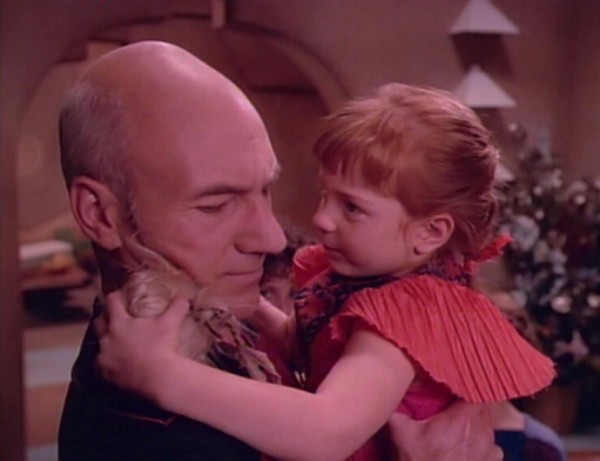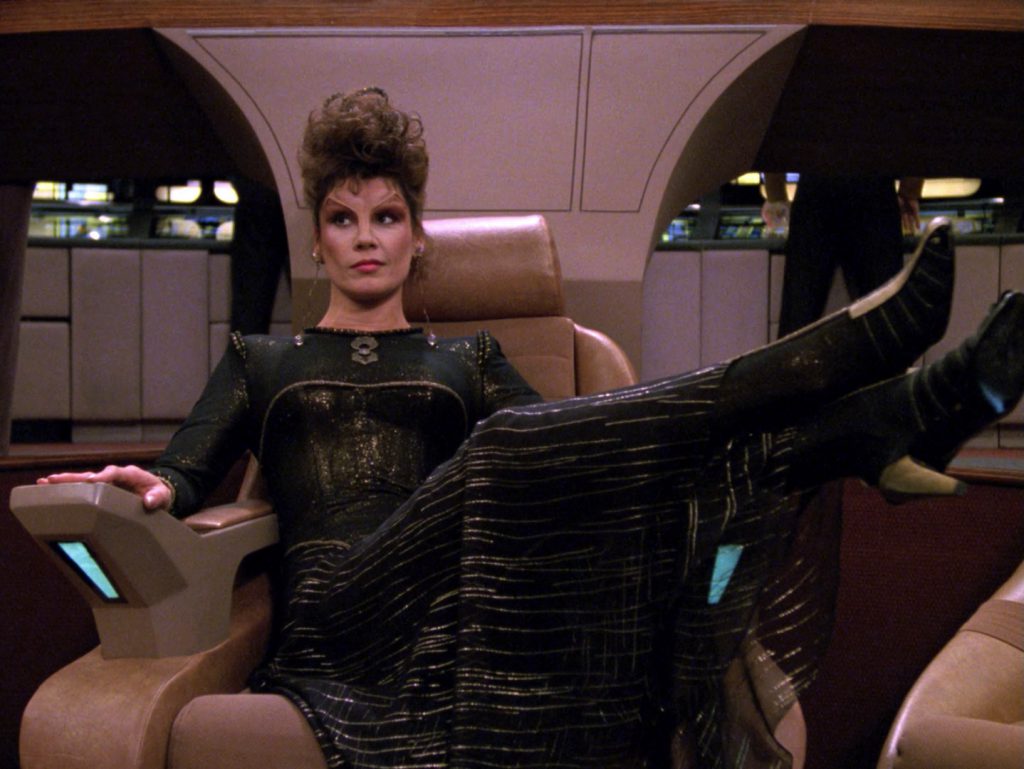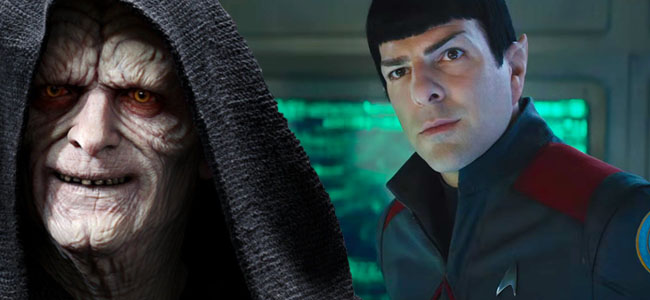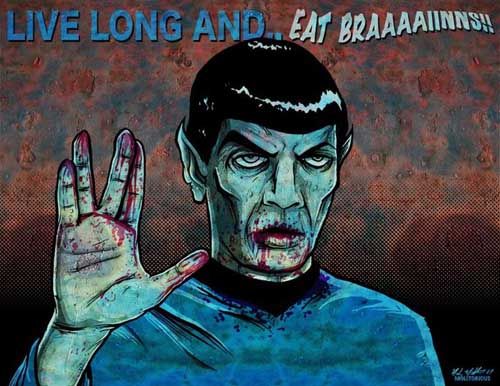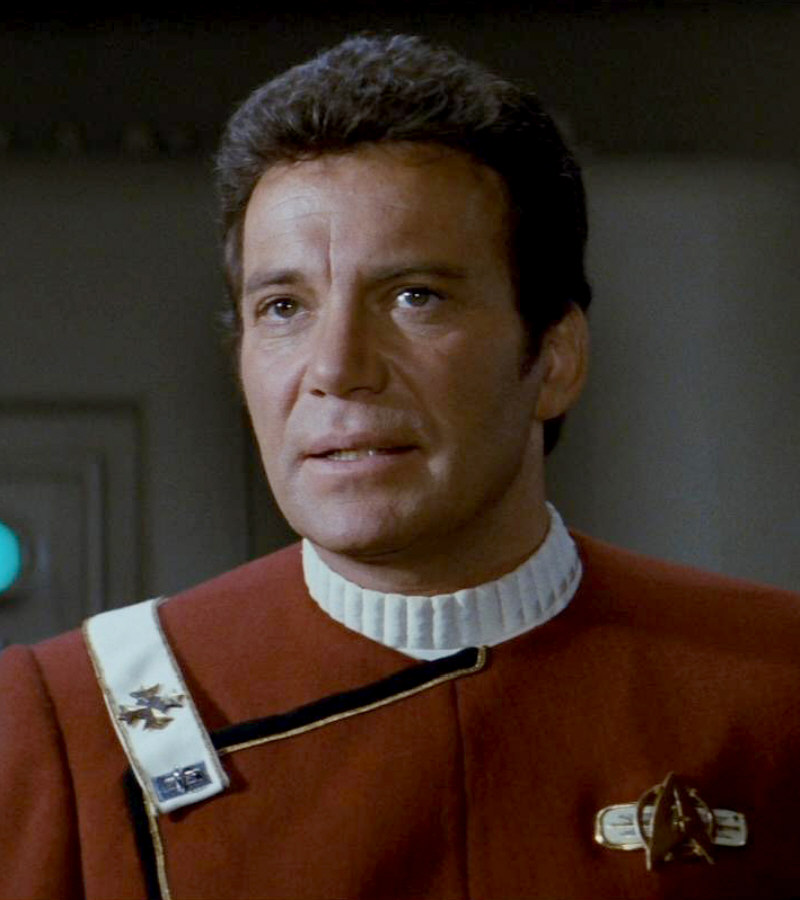Greatest Fears of Star Trek Characters
[stills from Star Trek: The Next Generation, Paramount Television]
October, the month of Halloween, has long been the time to revel in fears and scares. For the crew of Starfleet vessels, however, they have no time for safe cathartic thrills when constantly threatened by hostile species, new forms of alien life and the harsh environment of space. It could seem counterintuitive to believe that Starfleet officers are afraid of anything when they so regularly prove themselves to be cool under pressure, calmly handling the week’s latest potentially deadly crisis. Yet these Starfleet officers have rather unconventional fears – nonplussed by a Romulan sneak attack, but intimidated by something far less deadly.

Jean Luc Picard—Children
Known for his strong diplomatic skills and ability to sooth difficult situations, Jean Luc Picard is a creature of routine and habit. He likes his hot Earl Grey tea, operatic background music playing and a spotless bridge. Perhaps the biggest disruption to Picard’s ship-shape organisation is his greatest fear: children. Notoriously displeased by the family friendly community in the USS Enterprise-D, Picard finds it incredibly difficult to interact with children. Even Wesley Crusher, the son of two of Picard’s oldest friends, was a frustrating mystery to Picard until Wesley was able to take an active interest in the ship’s navigation.
Picard was forced to face his fears in a spooky incident in which a spacial anomaly meant that he was trapped in a turbolift with three winners of the elementary school science fair. As transporter chief O’Brien noted, it was unclear who was unhappier spending time with each other: Picard or the children. After the accident, Picard was initially overwhelmed by the crying children (including one who continued to insist that they would all die soon), but soon organised them into a makeshift crew, climbing the turbolift shaft while singing “Frere Jacques.” Captain Picard may never totally feel comfortable with children, but he was at least able to save the day and face his fears when disaster struck.

Quark—Trade Unions
The ultra-capitalist Ferengi society depends on exploitation of employees, friends and family. And as Quark’s brother Rom notes, other Ferengi don’t want to stop the exploitation of labor—they want to participate in it. Yet when Quark severely cuts his employees’ wages due to a slowdown in business, he has to deal with a fearful nemesis…trade unions (in this case, the Guild of Restaurant and Casino Employees.) A much-feared bogeyman, no Ferengi is expected to yield to negotiate with their employees for better working conditions.
Rom organises Quark’s workers into a union, Quark is determined not to give in, ignoring client boycotts, picket lines and pressure from Starfleet. It takes a couple of angry Nausicaans, hired by the Ferengi government to protect the ruthless money-grubbing Ferengi culture, to convince Quark that allowing a strike to continue could be far more dangerous to him than the treasonous action of negotiating with unions. Ever more willing to barter his way out of difficult situation than to fight his fears, Quark makes Rom an offer he can’t refuse – he will accede to the union’s demands so long as the union itself dissolves, avoiding the wrath of the Ferengi Commerce Authority. Far from the determined nature of a Federation officer facing his fears, Quark is a typical Ferengi: there is no monster who cannot be negotiated with and bought off with a sufficient quantity of gold-pressed latinum.

Will Riker—Captaincy
Will Riker is perhaps the best example of a successful first officer on a Starfleet ship. Extremely close with his captain, Jean Luc Picard, the two developed an unbreakable rapport, with Riker serving as the more action-focused, military-minded aide to the diplomatic Picard. Riker eventually turned down at least three command opportunities to remain on the Enterprise, leading several Starfleet admirals to speculate that Riker was uncomfortable with his own abilities, or with taking a role which required making the most difficult decisions on the bridge. Riker admitted to his former (and future) flame Deanna Troi that while he had pushed himself incredibly hard to reach the role of first officer, he had ceased to be truly ambitious once he reached the Enterprise, perhaps allowing personal comfort and satisfaction to soften his edges. Riker speculated that he may be afraid of the big chair – taking final responsibility for an entire ship and her crew instead of simply barking “shields up, red alert” when an enemy ship approaches.
When Picard was temporarily assimilated by the Borg, becoming Locutus, Riker was forced into the command he had so recently declined. The newly promoted wartime captain was forced to make difficult decisions, even ordering a brutal attack on the Borg which could have resulted in the death of his mentor. Riker may have been intimidated by the difficult weight of command, but when forced to protect his crew (and all of the Terran system), Riker stepped into the big chair, fired on his fear and made the most difficult calls of the captaincy.

Lieutenant Worf—His Softer Side
Perhaps to compensate for being raised by his adoptive human parents, Worf has always whole-heartedly embraced his Klingon culture, including a code of strict, at times brutal, honor. Worf has often found it difficult to warm to his young son, Alexander, a Klingon of mixed human heritage. Alexander is an inquisitive, friendly child, without a natural connection to Klingon battle ethos or honor-based culture of his birth. Worf often struggled to provide both the example of masculinity that he believes his son needed, as well as forming an emotional connection with Alexander.
The two eventually bond through Alexander’s experience in the Klingon Defence Forces, but Worf would continue to walk the balance between what he believed to be best for his son (harsh parenting) and attempting to provide a comforting, loving presence after the death of the boy’s mother. Yet Alexander is not the only person for whom Worf is uncomfortable showing a soft and warm heart. His courtship of his late wife Jadzia Dax was conducted through musings on Klingon opera and shared love of battle. Worf may pride himself on his combat tactics and strong sense of courage. He notes that dying to save fellow crew members is the dream of every Klingon. Yet his strong defense of his loved ones and oft-vivid internal struggle demonstrates that Worf is also a loving husband, father and a reliable friend and crewmate. Rather than facing his worries as to his softer side in one dramatic incident, Worf’s attempts to hide his warm heart has been a lifelong struggle – and a constant battle with that fear.
